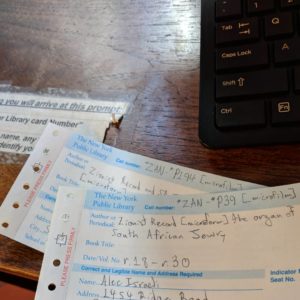At Princeton, we are lucky to have access to an incredible collection of research resources. Between our libraries’ collections on campus, online databases, ReCap storage, and Borrow Direct, almost all your research needs are right at your fingertips. And, for most of the papers you will write while here, this is probably the case. But, especially with independent work, you may need sources so niche or rare that Princeton just can’t provide them. I have found myself in this situation this semester, as I write my junior paper for my HIS 400 seminar. Here, I’ll share my experience navigating the search for niche sources, with tips for getting creative when searching for material at Firestone and beyond.
My paper focuses on the political thought of Henry Katzew (a Jewish South African journalist and writer), situating it in relation to other Jewish South African responses to apartheid, Zionism, and a diplomatic crisis which occurred between the Israeli and South African governments in 1961. Given how specific my topic has become, it was difficult finding sources, especially primary sources, at Princeton right off the bat. Still, with some time to think and the help of quite a few librarians (more on that below— they are truly research superheroes), I have managed to find the sources I need to complete the work.
Firstly, I found that broadening my understanding of what could count as a primary source opened up some options on campus. As I checked out book after book on South African Jewry for secondary reading, I noticed that a lot of them were published in South Africa during the 1950s and 1960s. That is, they were actually written by Katzew’s intellectual contemporaries. Though I intended these books to be secondary sources, I realized I could use them as primary sources. The way they wrote history said a lot about their politics and how they may have responded to Katzew’s ideas. The lesson here is that being open-minded about what kinds of sources you can use may mean that Firestone has more to offer you than meets the eye.
Of course, I can’t write my entire JP with just these few books. Most of my sources are the various newspapers and journals Katzew wrote for. Unfortunately, Firestone does not have any of these in its own collection. Upon discovering this I turned to WorldCat. WorldCat is a database which, if you look up a source, will tell you which libraries around the world have that source. From there, you can either go through the Interlibrary Loan system and try to get the materials you need sent to you (this may take a little while), or you can try to contact the libraries directly.
In my case, I found that the newspapers I needed were available at the New York Public Library and the Center for Jewish History in New York. Being from the area, I was able to spend much of spring break in these archives, reading South African Jewish newspapers on microfilm and in original print (check out fellow PCUR Rafi’s posts, here and here, with helpful tips on navigating the NYPL system and using microfilm to do research).

Here is where the superhero librarians come in. If you ever find that you need to do research at a library off campus, I highly recommend calling ahead to talk to a librarian about your work. A week before my visit to the Center for Jewish History, a reference staff member gave me detailed information about the Center’s holdings and which of my materials were available. This saved me a ton of time when I arrived. By the end of spring break, I was not able to get all I needed while I was there, so she was able to point me towards yet another librarian I could speak to about having the Center scan some items to send to me (this is a service that a lot of libraries will offer, though sometimes with a fee. It is definitely worth calling to find out).
Firestone’s own librarian for Jewish Studies David Hollander has directed me to some important sources here and even has facilitated contacting a librarian at the University of Cape Town in South Africa to see if she could send over some items in their library relating to Henry Katzew. I have now been in touch with this librarian for a few weeks, and it is looking like she might be able to send me some great stuff. I will be sure to keep the PCUR blog posted on that!
The takeaway here is that though the stacks at ‘Stone seem endless, there are incredible resources to be found beyond that are just a keyword search away. And even if the finitude of our library seems to offer you few sources, they can do wonders if you approach them with an open mind.
–Alec Israeli, Humanities Correspondent

